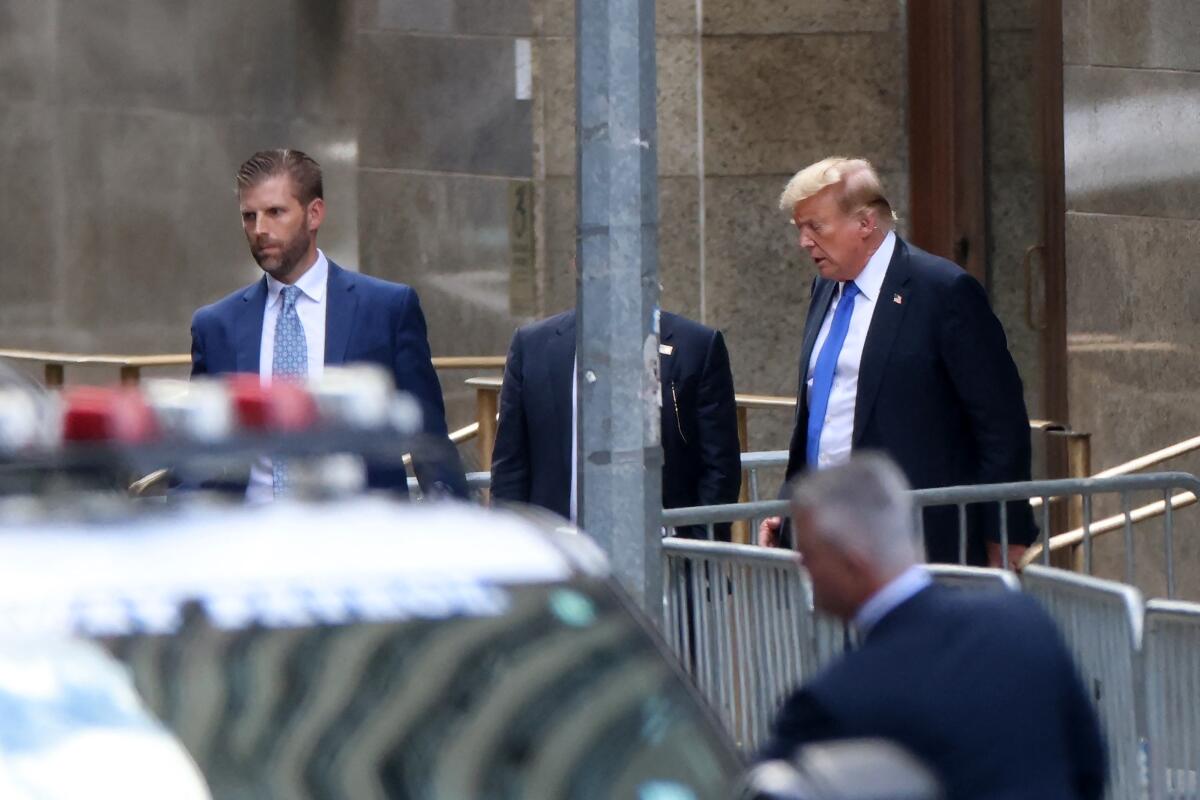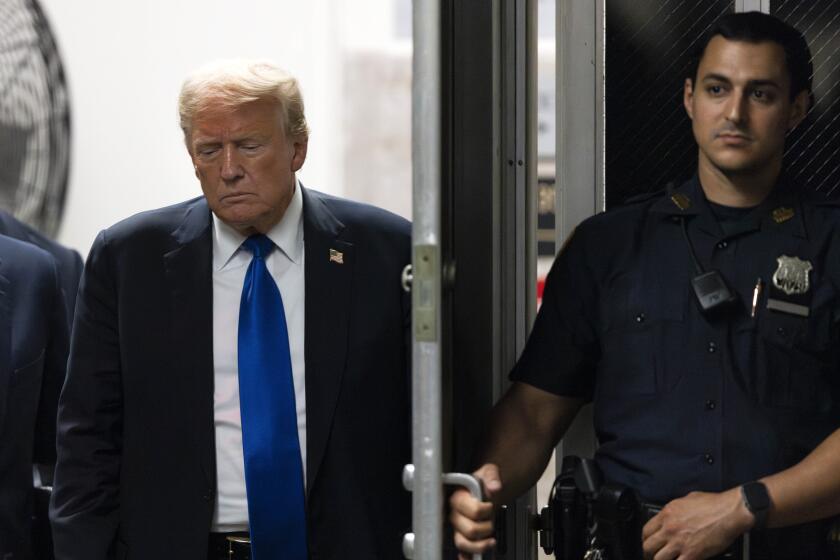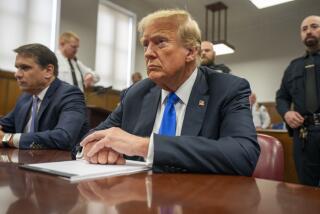Column: Trump is officially a convicted felon, but that may not stand in his way

WASHINGTON — Former President Trump’s conviction on 34 criminal counts of falsifying business records in New York is an ignoble first. No former president has ever been tried, much less found guilty, for felonies before.
But Trump’s new status as a convicted felon probably won’t significantly affect his chances of winning the 2024 presidential election.
That too is a strange historic first: a presidential candidate convicted of felonies, but suffering little if any political damage in the process.
However sensational the charges, which stemmed from hush money payments made to an adult film actor, many voters will react to the Manhattan jury’s decision with a shrug.
The conviction won’t prevent Trump from staying in the race until election day, and if he wins, he stands a good chance of avoiding serious penalties while he’s in the White House.
It won’t be easy to spin a conviction on 34 felony counts as a victory, but there are plenty of ways Trump can mitigate the consequences.
He’ll continue to claim that the process was unfair and politically motivated, as he did on his way out of the courthouse Thursday evening.
“This was a disgrace,” he said, standing behind a steel barricade. “It was a rigged trial by a conflicted judge. ... This was done by the Biden administration to wound, to hurt a political opponent.”
Jurors deliberated for 9½ hours over two days before convicting former President Trump of all 34 counts he faced in a hush-money scheme surrounding the 2016 election.
There is no evidence that the Biden administration has played any role in the case, which was brought by a state prosecutor with no involvement by the federal Justice Department.
“The real verdict is going to be Nov. 5 by the people,” Trump said, referring to election day.
If he appeals the verdict, as expected, that will allow him to argue — correctly — that a conviction isn’t final while it’s under challenge. Not incidentally, it will also keep him out of jail, at least for a while.
Get the L.A. Times Politics newsletter
Deeply reported insights into legislation, politics and policy from Sacramento, Washington and beyond. In your inbox three times per week.
You may occasionally receive promotional content from the Los Angeles Times.
After the verdict, Judge Juan M. Merchan scheduled Trump’s sentencing for July 11, four days before the Republican National Convention in Milwaukee. Lawyers said it was unlikely that Merchan would order Trump jailed if an appeal is pending.
Under New York law, Trump’s lawyers have 30 days to file a notice of appeal and six months to file briefs supporting the appeal — a period that would extend well past election day.
Several polls in recent weeks have suggested that a guilty verdict could shift a significant number of voters away from Trump, but pollsters and strategists in both parties doubt that any such effect will be significant or lasting.
“If I were betting, I’d bet on no impact — or on a flutter in the polls, followed by a return to the status quo,” Democratic pollster Mark Mellman said.
In an ABC News/IPSOS poll last month, 16% of Trump’s current voters said they would “reconsider” supporting him if he were convicted in the New York case. Only 4% said they would definitely stop supporting him. But voters are often unreliable predictors of their own reactions, the pollsters said.
Trump was asked whether the election would end in political violence if he lost. “It depends,” the former president said. Here’s what he meant by that.
Trump voters have proved fiercely loyal to their favored candidate, felon or not.
Trump himself has marveled at the phenomenon. “I could stand in the middle of Fifth Avenue and shoot somebody and wouldn’t lose any voters, OK?” he said in 2016. “It’s, like, incredible.”
What if Trump’s hush-money criminal trial, with details on Stormy Daniels, Karen McDougal, the ‘Access Hollywood’ tape, is a cure for voters’ ‘Trump amnesia’?
Within minutes of Thursday’s verdict, Republican leaders in Congress echoed Trump in denouncing the trial — a sign that GOP ranks are likely to close around their presumptive nominee.
“Today is a shameful day in American history,” House Speaker Mike Johnson (R-La.) said in a prepared statement. “This was a purely political exercise, not a legal one.”
Sen. Lindsey Graham (R-S.C.), another Trump ally, predicted that the trial “will backfire tremendously” on Democrats and added: “I expect this case to be reversed on appeal.”
Trump himself used the verdict to solicit donations from supporters. “I am a political prisoner!” he declared in an email and a social media post. (He has not been imprisoned; he returned to his Trump Tower apartment after the trial concluded on Thursday.)
The presumptive Republican nominee has primed his supporters for months to ignore a guilty verdict by relentlessly attacking the cases against him as politically motivated.
“If I were trying to design a court case that would be easy for Republicans to dismiss as a partisan witch hunt, I would design the New York case,” Republican pollster Whit Ayres said, noting that Manhattan Dist. Atty. Alvin Bragg is not only a Democrat but a vocal Trump critic.
Six months ago, any of the four criminal cases against Trump could have threatened his presidential campaign: a federal prosecution stemming from his supporters’ invasion of the Capitol on Jan. 6, 2021; a federal case on charges he illegally retained highly classified documents; a Georgia election interference case; and the New York business fraud case.
Even with the New York verdict, Trump and his lawyers have postponed any final reckoning until after election day: Three trials are delayed and he will probably appeal his verdict in the fourth, a process that would last far beyond the election.
Those charges aren’t going away, but if Trump becomes president, he can order the Justice Department to halt the two federal cases. Some career Justice Department officials might refuse to carry out those orders, but a newly inaugurated president will presumably be able to find — or appoint — someone willing to do his bidding.
And under most legal precedent, state courts would put his prosecutions in New York and Georgia on hold while he’s in the White House. If he takes office in January and completes a full term, none of the cases would be decided before 2029, when he’ll be 82.
Being the first former president ever convicted on criminal charges is a dubious achievement, to be sure.
Equally unprecedented — and potentially more damaging to democracy — Trump has given future politicians a dangerous example: He has shown that felony convictions need not stand in the way of success.
Read more McManus columns on Trump:
Trump has big plans for California if he wins a second term. Fasten your seatbelts
Trump wants to round up over a million undocumented migrants from California. Here’s how he might do it
Trump loves fossil fuels; California wants clean energy. Cue collision
More to Read
Sign up for Essential California
The most important California stories and recommendations in your inbox every morning.
You may occasionally receive promotional content from the Los Angeles Times.














